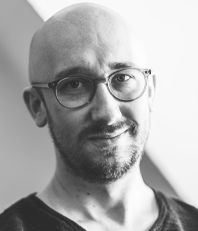
Timothy McCormack
Assistant Professor, Department of Music

- Q&A
- Biography
Q&A
What excites you most about joining our School of Arts and Humanities community?
“I’m very excited to work with the students! I’ve had the joy of knowing former UC San Diego students as my friends, colleagues, teachers and collaborators for years. Everyone I know who has come through the School of Arts and Humanities are such different artists, composers and thinkers, but they all share the qualities of being fiercely focused, infectiously passionate, exuberantly curious and creatively compassionate. I look forward to sharing knowledge with the students at UC San Diego!”
Why did you choose your field? Why should students consider studying the arts and humanities?
“When I was young, I loved learning many instruments (master of none), and eventually that led to writing my own music for the instruments I knew how to play. Years later, once I started writing for musicians other than myself, I found so much inspiration in the collaborative aspect of music making. Later still I realized how working within a medium whose material is both invisible (sound) and ephemeral (time) is both an invigorating challenge AND where my brain feels right at home.”
“I tell my students all the time: the music we write is a reflection of how we see the world, of how we process information. And I think that this is why one should consider pursuing study in the arts and humanities; you can find a subject, or a medium or a field that makes intuitive, perhaps inscrutable, sense to you, and from there it is your personal perspective and sensibility that can become the foundation for your particular contribution to that field.”
What research or project are you working on currently?
“I’ve just begun work on my first piece for orchestra! It’s being written for the BBC Scottish Symphony Orchestra for their annual Tectonics Festival. Titled ‘a vapor (no body, no image),’ the piece reflects on the contemporary queer community’s relationship with the AIDS epidemic of the 1980’s and 90’s. Specifically, how it has altered, for queer people, what it means to mourn, to grieve and to be part of a community that includes both the living and the dead.”
What’s your favorite class to teach and why?
“I love teaching my class ‘Analysis of Contemporary Music’ because we focus on music for which there is no systematic means of analysis, and thus we use the music itself to gain insight on each particular composer’s logic, sensibility and decision-making process. I love diving deep into somebody else’s world, learning the inscrutable rules that govern their creative process. It’s a bit like being on an archeological dig of the ephemeral!”
What is something about yourself that is not typically included in your bio?
“I also have a background in contemporary dance! I love to cook and am famous (...within my family…) for making the fluffiest buttermilk biscuits! My dog, Griswold, has a far better singing voice than me!”
Biography
Timothy (Ti) McCormack is a composer of experimental music written primarily for acoustic instruments. Through their music, they research instrumental mechanism and physicality, as well as form’s impact on time and the listening experience. McCormack’s work is also influenced by queer aesthetics, hæmal ancestries and incurable disease. Their work can be heard on several recordings released on the Huddersfield Contemporary Records label and their portrait disc, “KARST,” released on KAIROS Records.
McCormack earned an MPhil in composition from the University of Huddersfield and a Ph.D. in composition from Harvard University. They are the recipient of the prestigious Ernst von Siemens Musikstiftung Composers’ Prize (2018) and won the Impuls International Composition Competition (2019), which resulted in a new work for Klangforum Wien.
